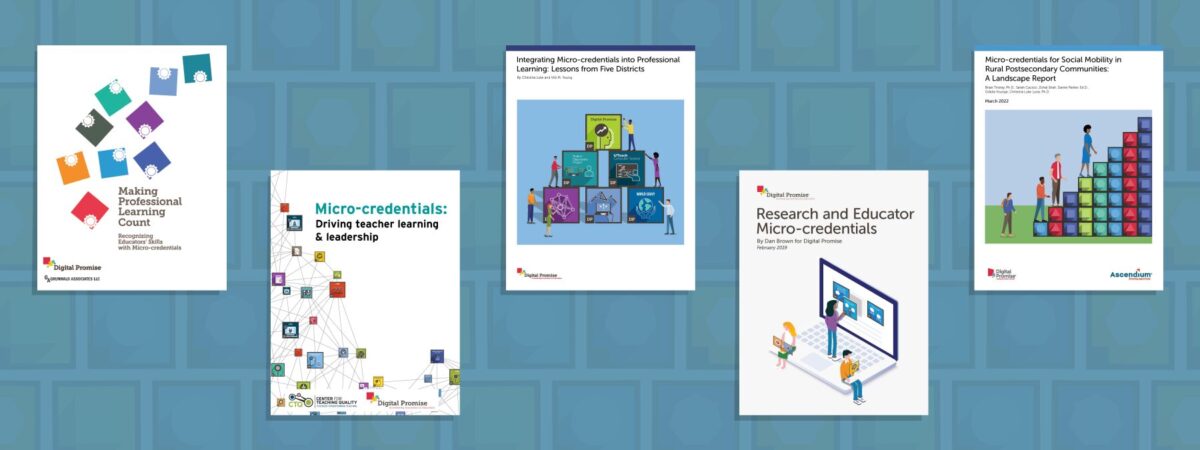
Though some of their contexts may have changed, these reports and research offer insight and recommendations for the successful implementation of competency-based micro-credentials that are still relevant today.
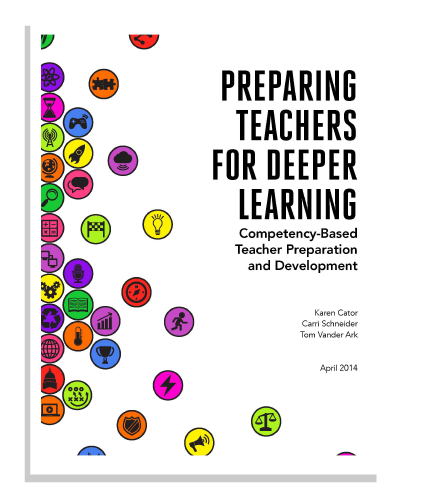 Preparing Teachers for Deeper Learning (2014) explores the attributes of teacher preparation and offers recommendations to support the development of teacher preparation and its programs that will equip teachers to thrive. The report introduces the concept of micro-credentialing as a competency recognition system, which can be incorporated into teacher preparation programs.
Preparing Teachers for Deeper Learning (2014) explores the attributes of teacher preparation and offers recommendations to support the development of teacher preparation and its programs that will equip teachers to thrive. The report introduces the concept of micro-credentialing as a competency recognition system, which can be incorporated into teacher preparation programs.
Check out this report if you’re interested in recommendations that will move the field toward a competency-based system.
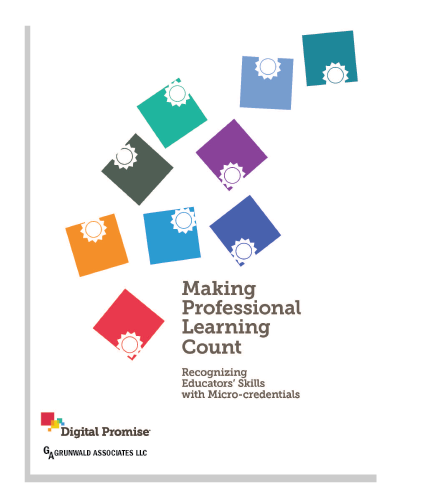 Making Professional Learning Count (2015) highlights the importance of effective professional development for educators. It also presents teachers’ stance toward competency-based professional learning and how micro-credentials can recognize this learning. Through micro-credentials, educators identify specific competencies to develop, submit evidence of competence, and receive recognition of competence.
Making Professional Learning Count (2015) highlights the importance of effective professional development for educators. It also presents teachers’ stance toward competency-based professional learning and how micro-credentials can recognize this learning. Through micro-credentials, educators identify specific competencies to develop, submit evidence of competence, and receive recognition of competence.Check out this report if you’re interested in the design and development of a comprehensive and effective educator micro-credential system that supports the advancement of educators.
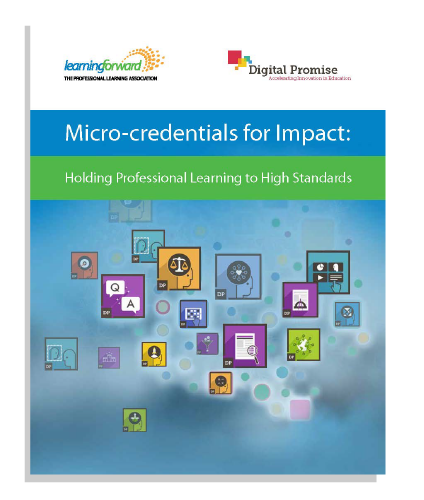 Micro-credentials for Impact: Holding Professional Learning to High Standards (2016) shares the blueprint for creating a micro-credential system that enables powerful professional learning for educators. It dives into standards for professional learning, such as learning communities, leadership, and implementation, and how micro-credentials align with each standard.
Micro-credentials for Impact: Holding Professional Learning to High Standards (2016) shares the blueprint for creating a micro-credential system that enables powerful professional learning for educators. It dives into standards for professional learning, such as learning communities, leadership, and implementation, and how micro-credentials align with each standard.Check out this report if you’re interested in effective professional learning being recognized through micro-credentials.
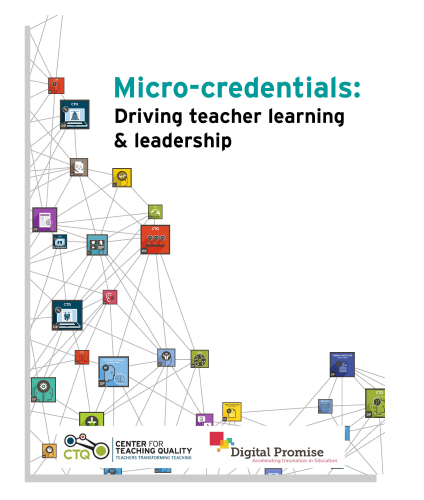 Micro-credentials: Driving Teacher Learning and Leadership (2016) explores the power of micro-credentials to support educator learning and leadership. It presents professional development for teachers, defines micro-credentialing and its benefits, surveys the United States policy landscape, and identifies the next steps toward micro-credentialing.
Micro-credentials: Driving Teacher Learning and Leadership (2016) explores the power of micro-credentials to support educator learning and leadership. It presents professional development for teachers, defines micro-credentialing and its benefits, surveys the United States policy landscape, and identifies the next steps toward micro-credentialing.Check out this report if you’re interested in implementing micro-credentials to recognize the competence of skills teachers acquire through professional development at the district or state level.
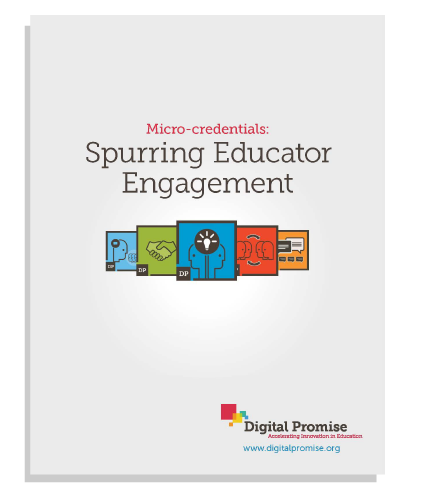 Micro-credentials: Spurring Educator Engagement (2016) highlights incentive strategies that support more comprehensive professional development for educators to earn micro-credentials.
Micro-credentials: Spurring Educator Engagement (2016) highlights incentive strategies that support more comprehensive professional development for educators to earn micro-credentials.Check out this report if you’re a district or state education agency considering how micro-credentials can recognize educators’ ongoing and informal learning.
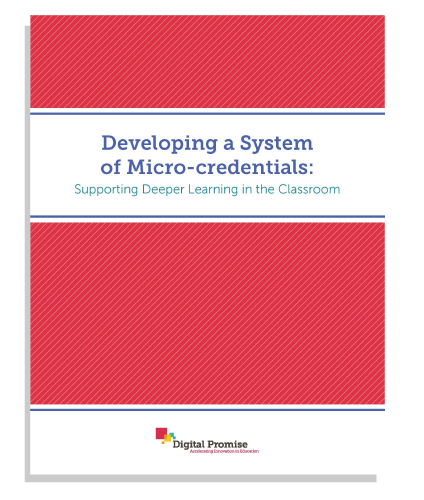 Developing a System of Micro-credentials: Supporting Deeper Learning in the Classroom (2018) explores how micro-credentials help educators prepare more self-directed, intellectually curious, and engaged students for college and career readiness.
Developing a System of Micro-credentials: Supporting Deeper Learning in the Classroom (2018) explores how micro-credentials help educators prepare more self-directed, intellectually curious, and engaged students for college and career readiness.Check out this report if you’re interested in learning about the framework for deeper learning and deeper learning micro-credentials.
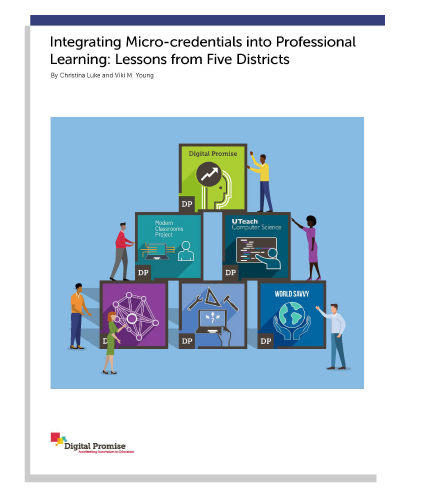 Integrating Micro-credentials into Professional Learning: Lessons from Five Districts (2020) shares insights and experiences from administrators and educators whose school districts integrated micro-credentials to support professional learning around computational thinking.
Integrating Micro-credentials into Professional Learning: Lessons from Five Districts (2020) shares insights and experiences from administrators and educators whose school districts integrated micro-credentials to support professional learning around computational thinking.Check out this report if you’re interested in recommendations for integrating micro-credentials effectively, ideas for encouraging learning through micro-credentials, strategies for fostering learning through micro-credentials, approaches to supporting and growing the role of micro-credentials for professional learning, and understandings on evolving policies for micro-credential integration.
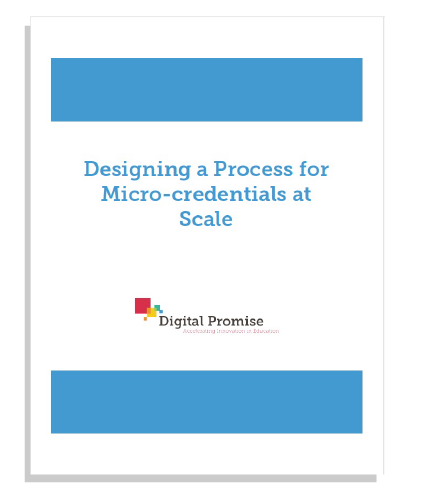 Designing a Process for Micro-credentials at Scale (2016) presents how to scale the micro-credential assessment process by creating a pool of qualified reviewers and maintaining quality and consistency in the review process.
Designing a Process for Micro-credentials at Scale (2016) presents how to scale the micro-credential assessment process by creating a pool of qualified reviewers and maintaining quality and consistency in the review process.
Check out this report if you’re interested in a five-step workflow that will help scale the micro-credential assessment process to meet the needs of your learners as an issuing organization.
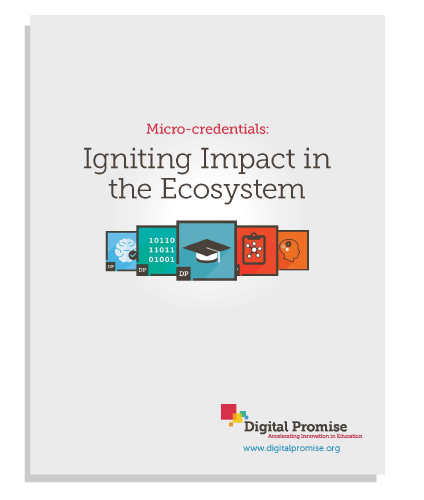 Micro-credentials: Igniting Impact in the Ecosystem (2016) shares the promising stories of two issuing partners on their micro-credential implementation journeys.
Micro-credentials: Igniting Impact in the Ecosystem (2016) shares the promising stories of two issuing partners on their micro-credential implementation journeys.Check out this report to learn how to help shape a path for your district or organization to develop your own micro-credential journey that will support powerful learning for your teachers and students.
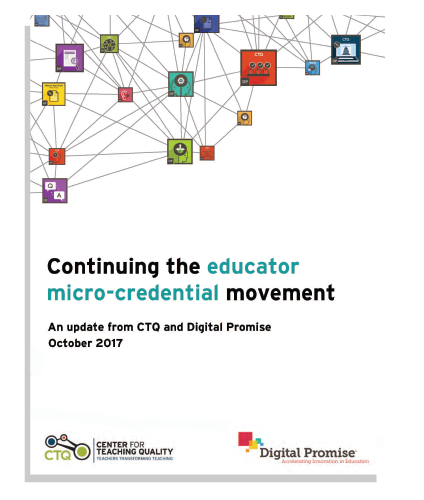 Continuing the Educator Micro-credential Movement (2017) explores the current micro-credential ecosystem and presents case studies of micro-credential implementation to share intervention strategies and major challenges.
Continuing the Educator Micro-credential Movement (2017) explores the current micro-credential ecosystem and presents case studies of micro-credential implementation to share intervention strategies and major challenges.Check out this report to learn about creating the currency, supporting conditions for professional learning, developing the assessment infrastructure, establishing financial feasibility, and ensuring technical functionality as an issuing organization.
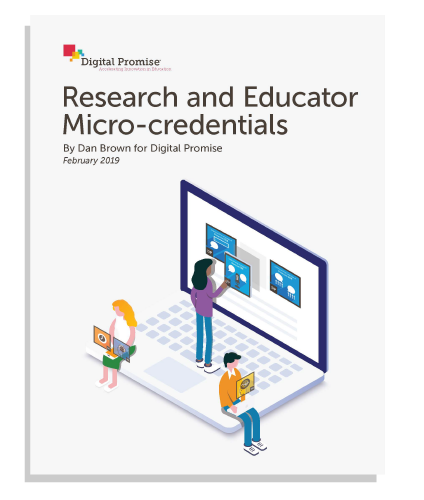 Research and Educator Micro-credentials (2019) highlights how Digital Promise screens future issuers to comprehend the research grounding their work.
Research and Educator Micro-credentials (2019) highlights how Digital Promise screens future issuers to comprehend the research grounding their work.Check out this report if you’re interested in learning how Digital Promise has ensured the content of the micro-credentials in its ecosystem by anchoring them in rigorous research.
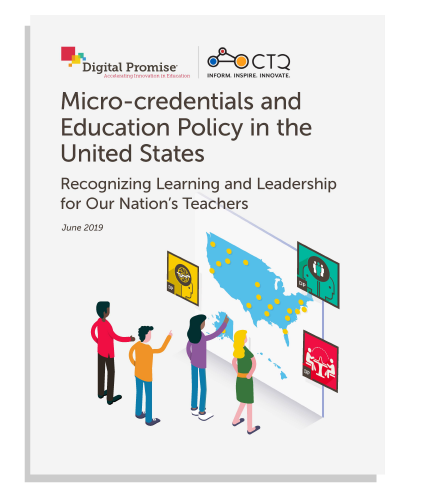 Micro-credentials and Education Policy in the United States: Recognizing Learning and Leadership for Our Nation’s Teachers (2019) presents teaching policy issues that need to be addressed to allow micro-credentials to transform professional learning sought by teachers and supported by research. It also explores how many states, districts, and teachers’ unions are using micro-credentials.
Micro-credentials and Education Policy in the United States: Recognizing Learning and Leadership for Our Nation’s Teachers (2019) presents teaching policy issues that need to be addressed to allow micro-credentials to transform professional learning sought by teachers and supported by research. It also explores how many states, districts, and teachers’ unions are using micro-credentials.
Check out this report if you’re interested in learning how micro-credentials fit into current teaching policies and how they can be used to transform them.
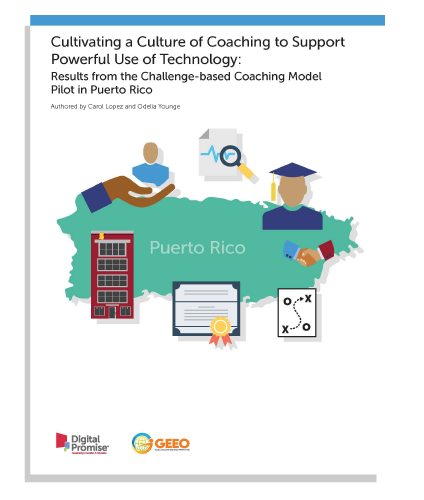 Cultivating a Culture of Coaching to Support Powerful Use of Technology: Results from the Challenge-Based Coaching Model Pilot in Puerto Rico (2021) presents the research from a six-month coaching pilot with 10 schools throughout Puerto Rico.
Cultivating a Culture of Coaching to Support Powerful Use of Technology: Results from the Challenge-Based Coaching Model Pilot in Puerto Rico (2021) presents the research from a six-month coaching pilot with 10 schools throughout Puerto Rico.
Check out this report if you’re interested in learning how teachers, coaches, and school leaders engaged with micro-credentials to cultivate and recognize their professional learning journey on coaching, systems change, and technology. This report is also available in Spanish.
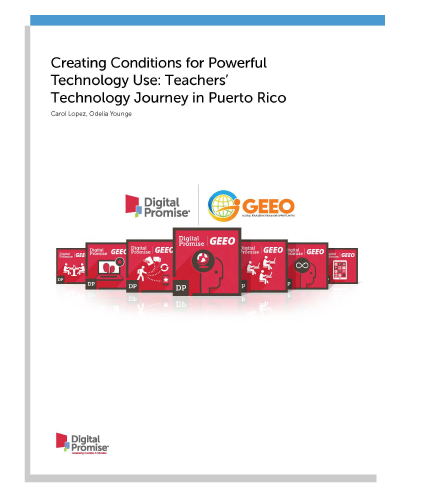 Creating Conditions for Powerful Technology Use: Teachers’ Technology Journey in Puerto Rico (2021) considers the perspectives of 14 teachers in Puerto Rico on the effectiveness and impact of professional learning supports for technology integration and use, including competency-based micro-credentials.
Creating Conditions for Powerful Technology Use: Teachers’ Technology Journey in Puerto Rico (2021) considers the perspectives of 14 teachers in Puerto Rico on the effectiveness and impact of professional learning supports for technology integration and use, including competency-based micro-credentials.Check out this report if you’re interested in the insights gained to improve instructional technology use and integration.
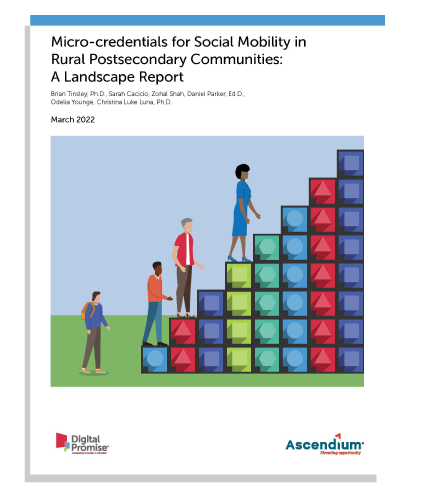 Micro-credentials for Social Mobility in Rural Postsecondary Communities: A Landscape Report (2022) highlights four case studies on how earning micro-credentials may lead to credential attainment, workforce entry, promotions, and/or economic improvements, particularly for historically and systematically excluded populations.
Micro-credentials for Social Mobility in Rural Postsecondary Communities: A Landscape Report (2022) highlights four case studies on how earning micro-credentials may lead to credential attainment, workforce entry, promotions, and/or economic improvements, particularly for historically and systematically excluded populations.
Check out this report if you’re interested in rural micro-credential initiatives designed to promote social mobility for HSE populations.
Digital Promise has been a pioneer in competency-based micro-credentials and has more than 10 years of experience in supporting organizations with their micro-credentialing needs. Check out this eBook, The Role of Micro-Credentials in Lifelong Learning and Development: Empowering Learners, Empowering Organizations, a comprehensive resource accessible to all interested in understanding micro-credentials. If you are interested in learning more about Digital Promise’s micro-credential services, please contact us at microcredentials@digitalpromise.org.